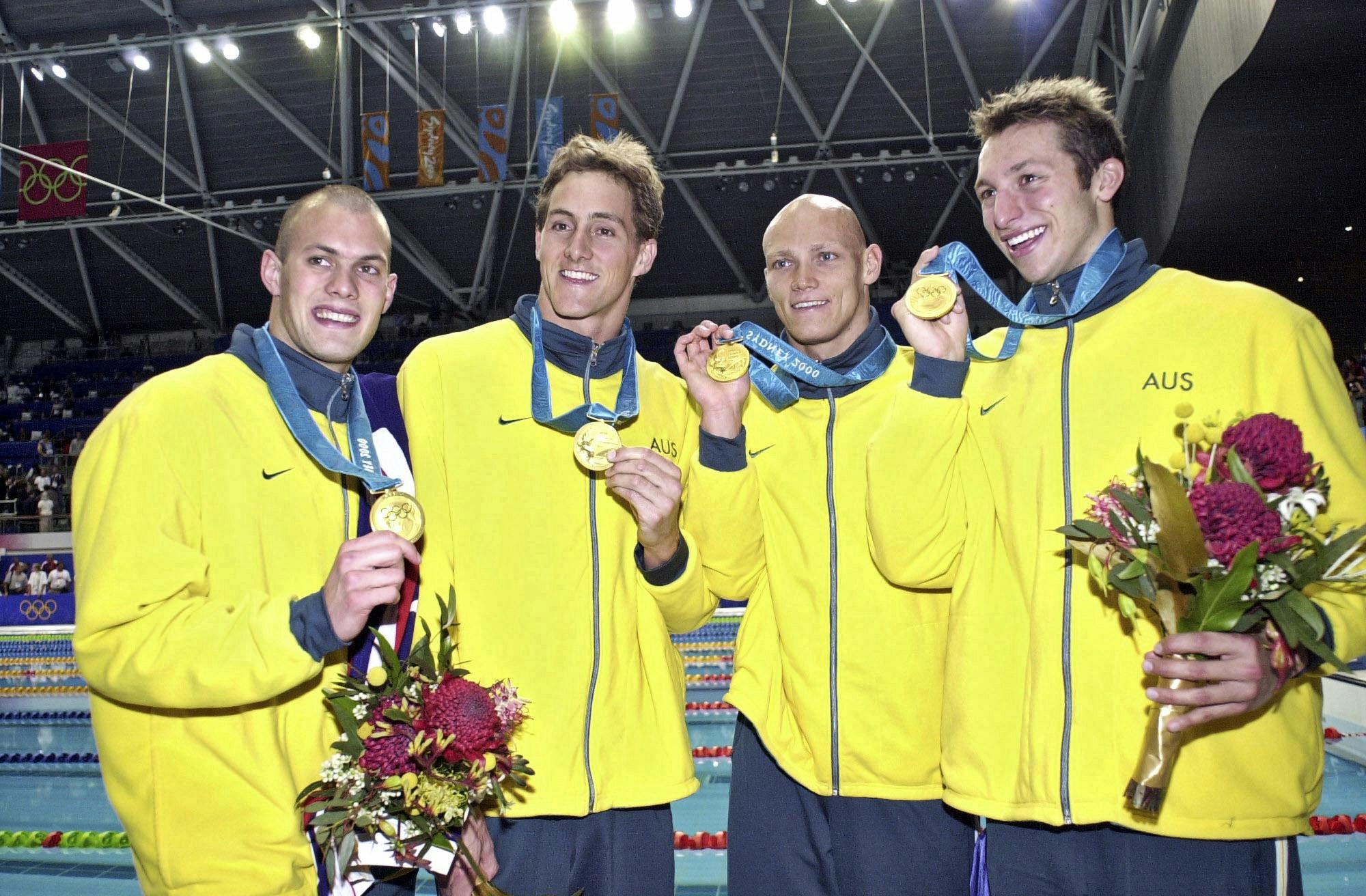This article is taken from the July 2025 issue of The Critic. To get the full magazine why not subscribe? Right now we’re offering five issues for just £25.
“We will smash them like guitars.”
This is what US swimmer Gary Hall, Jr, says about the Australian 4×100 freestyle relay team. And why not? The relay’s been held in seven previous Olympics, and the USA has won the lot. An eighth gold in Sydney isn’t just an American hope: it’s their turf, their birthright. Hall, the showman fond of flexing his biceps and shadowboxing before races, is the perfect man to say so.
“We will smash them like guitars.”
For the Aussie swimmers, it’s fuel. Every time they get in the pool and push themselves through yet another murderous training block, they hear those six words and vow to shove them one by one back down Hall’s big Texan mouth.
“We will smash them like guitars.”
There’s no event in the pool more anticipated than this one. Hosts against holders, David against Goliath, twin arrowheads in the centre lanes.
Michael Klim is lead-off man for Australia. Eyes burning beneath his shaved scalp, he stands statue-still, drawing his energy from the rampant crowd. The clock says 8.15 pm. The atmosphere says high noon.
To their blocks. America’s first man Anthony Ervin is fast, but Klim is faster. Most international swimmers are elegant stylists, even at full speed. Not Klim. He keeps his arms straight on the recovery and slaps the water with angry hands. He isn’t pretty, but boy is he quick: quicker not just than anybody’s ever led off a relay, but quicker than anybody’s ever swum full stop. 100m in 48.18 seconds: a new world record.
Klim hands over to Chris Fydler, one of the most popular guys on the circuit. “If they gave out gold medals for being a good bloke,” veteran commentator Dennis Cometti once said, “Chris would have a bagful.” Not tonight. Tonight, Fydler is no one’s friend. He’s a machine. Neil Walker closes the gap. Fydler grits his teeth and pulls away again.

Quarter of a second between them at half way. The third leg is a carbon copy of the second: Ashley Callus ahead for Australia, Jason Lezak closing for the USA, Callus pulling away again. It’s as though the two squads are connected by elastic.
On the blocks, Hall waits for his changeover. He doesn’t look across at the kid next to him, a prodigy whose age matches his shoe size: 17. His name is Ian Thorpe.
Although Thorpe has won the 400m earlier today, he’s not yet the megastar he’ll become. For now, he’s still the upstart taking on the main man. Hall is a faster sprinter. But Thorpe has the fearlessness of youth. And he has the crowd. A detonation of noise, appreciably louder even than the frenzied yelling so far, as Thorpe hits the water a metre up. “Listen to that roar,” says Cometti. “Narrow margin for the Australians, but look at Hall start the motor.”
Hall is flying. By the turn, he’s not only wiped out the deficit: he’s reversed it. Now, for the first time, the Americans are ahead. Coming off the wall, Thorpe glances across, sees the gap, puts in perhaps the two largest dolphin kicks ever seen outside Seaworld and sets about swimming his man down. Cometti is growling. “What can the champ muster? Now he’s digging deep. The crowd is roaring. Their hero is coming on. Will it be a fairytale?” If it is, it’s not so much Disney and princesses as the Brothers Grimm: two men dredging the darkness where their final reserves lie hidden. It’s Old Testament, this last length — not just stroke for stroke but measure for measure, stripe for stripe, burning for burning.
Thorpe’s absurd flipper-sized feet churn the water into fountains. With 15 metres to go he’s on Hall’s shoulder. With ten to go they’re level. With five to go Thorpe is past. He touches the wall 0.19 seconds ahead amidst bedlam, and springs from the water almost without levering himself over the side. Instinctively, he and his team-mates begin playing air guitar.
They’re still hugging and whooping when Hall appears in their huddle, hand extended in congratulation. “The best race I’ve ever been part of,” he says later. “I doff my cap to the great Ian Thorpe. He swam better than I did.”
Actually, he didn’t. Hall was marginally quicker over that last leg, though he lost it at the end. But that’s Hall all over: a much more thoughtful and sensitive soul than his loudmouth exterior suggests — and a resilient one too. He’s recently been diagnosed with diabetes and advised to stop swimming. Fat chance of that, not for such a consummate competitor.
He knows too what others prefer to forget: that the “smash them like guitars” quote has been taken badly, perhaps deliberately, out of context.
His full text is gracious and appreciative. “I like Australia, in truth. I like Australians. The country is beautiful, and the people are admirable. Good humour and genuine kindness seem a predominant characteristic. My biased opinion says that we will smash them like guitars. Historically the US has always risen to the occasion. But the logic in that remote area of my brain says it won’t be so easy for the United States to dominate the waters this time. Whatever the results, the world will witness great swimming.”
That we did, Gary. That we most certainly did.












